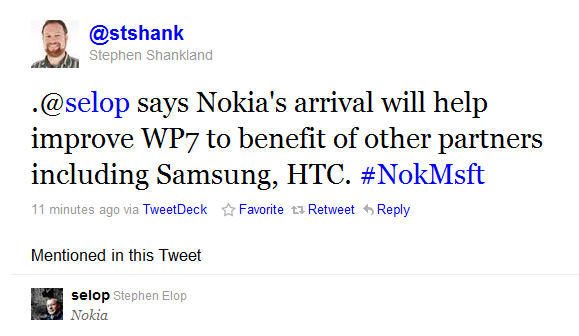What will the Nokia deal mean for Microsoft's other phone-maker partners?

What does a multi-partner ecosystem look like when not all participants are deemed equal?
Giving Windows Phone a huge shot in the arm, the number one worldwide mobile phone vendor Nokia announced a sweeping partnership with Microsoft on February 11. (Yes, I was wrong. I thought Nokia would go Android, a move Nokia CEO Stephen Elop acknowledged today that he considered. Gobble, gobble.)
Nokia didn't become just another Microsoft handset partner via today's agreement, like HTC, LG, Samsung and Dell. According to the announcement, Nokia would is going to have direct input on the future of Windows Phone, influencing key areas like maps, imaging and the marketplace. From today's Microsoft/Nokia announcement:
"Nokia will help drive and define the future of Windows Phone. Nokia will contribute its expertise on hardware design, language support, and help bring Windows Phone to a larger range of price points, market segments and geographies."
Microsoft reportedly is paying Nokia hundreds of millions of dollars to secure the deal. In exchange, Nokia has agreed to make Windows Phone its principal smartphone operating system. Nokia, in turn, becomes a key backer of Bing, adCenter, Office Mobile, Visual Studio, Silverlight and XNA.
So if you're HTC or Samsung, do you keep your eggs in the Windows Phone basket or put more in the Android one? (The smartphone market is now, for the most part, a three-horse race, with partner-free Apple being the third horse.) And what will this mean for Windows Phone customers, in terms of device choice?
The issue is already on people's minds. Here's a tweet from CNET's Stephen Shankland, covering the Nokia-Microsoft press conference this morning:
Microsoft has made much of its decision with Windows Phone 7 to "lock down" the base platform, providing OEMs with less opportunity to customize. That has been seen by most company watchers, developers and customers as a plus and a way for Microsoft to avoid the problems that plagued Windows Mobile (and Android) -- specifically too many designs with too little in common. But Microsoft is changing the rules for Nokia and allowing Nokia to customize the WP7 platform. Does that mean Microsoft is going to grant other OEMs the same concessions? (And if not, will that lead them to walk?)
Next week's Mobile World Congress should be an interesting one. Wish I could be a fly on the wall in Microsoft's meetings with its partners....
